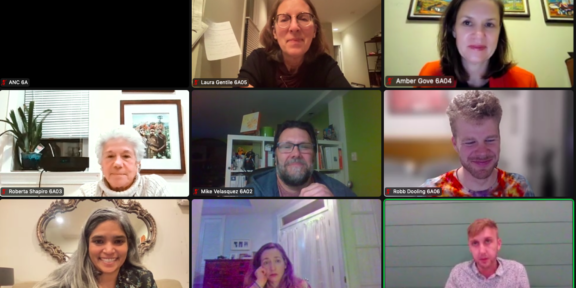Today’s bad economy prevents students from paying for college as well as supporting local businesses that rely on them. As a result, businesses located near college campuses are not doing as well as they have in the past.
Georgia Avenue is home to many businesses that are patronized by students including Up Against the Wall, Last Stop, and Susans Fashion.
Up Against the Wall is a designer clothing and accessories store. The store’s manager Al Hebron said sales began to decline with the beginning of the recession.
“In the month of October, because of Homecoming, 60 percent of the sales are from students and employees of Howard University,” Hebron said. “During the other months, it’s about a 50 to 50 students and employees as well as local foot traffic,” he said.
Since people are being more conscious about the amount of money that they spend, Up Against the Wall is catering to them by having 50 percent off sales.
“I think the sales are a good thing because a lot of us cannot afford to pay what we could last year for the same items of clothing,” Lexus Henry said, a sophomore majoring in finance at Howard University.
Last Stop, also sells a variety of clothing and accessories for young people. Manager George Jackson said that they too are suffering.
“Everybody’s losing revenue because of the recession and the lack of student support,” Jackson said.
However, Jackson did point out that their revenue tends to increase during the winter season because the students buy coats and other costly seasonal items.
Susans Fashion sells mostly party and casual attire and they have also experienced a drop in revenue. Denise Sawyer, an employee there said students are a small percentage of their customer base. She said that the store may have more local customers.
“I think we have more local customers because they know our merchandise and they know exactly what they want from us,” she said.
Sawyer said the local customers like their merchandise and would wear it more often than the Howard students. Sawyer thinks the apparel they sell appeals to students when there is a special event in which party attire is necessary.
“A good amount of students only come in when there is a cabaret or some type of big party, whereas locals come in more often,” she said.
Though sales are not as high as they have been, they have not hit rock bottom and Georgia Avenue merchants are optimistic that business will return to pre-recession levels.
Area merchants relied heavily on student shoppers to increase the businesses’ profits. But as college becomes increasingly difficult to afford, and with jobs hard to find and parents cutting back the amount of money they normally give to their children, college students just don’t have enough to spend on services and goods of local businesses.
Pedro de la Torre III, the Advocacy Senior Associate for Campus Progress at the Center for American Progress, thinks that one of the reasons why this occurs is because the “student aid has failed to keep up with college costs.”
According to the Mortenson Seminar on Public Policy Analysis of Opportunity for Postsecondary Education, one form of federal financial aid, the Pell Grant, covered 72 percent of the cost of a public four-year college in 1976 but only 33 percent in 2006.
“This forces too many students into situations that hinder their ability to complete their education, or make them forgo better schools for which they are qualified, but cannot afford,” Torre said.
Without financial aid, many students find it hard to pay for their education and even harder to shop. Many students have had to take on jobs to supplement their financial aid.
“Those who do successfully complete this gauntlet of high costs and tough decisions often still face excessive levels of student debt, which discourages many from making major life decisions like attending graduate school, getting married, or buying a home,” Torre said.
Meanwhile the businesses that students frequent are struggling to hang on.
Janene Jackson, senior vice president of government relations and public policy at the D.C. Chamber of Commerce, said although many businesses in the district are taking a hit during the recession, smaller businesses are getting hit the hardest.
“Smaller businesses are cash sensitive,” Jackson said noting that smaller businesses may not have the luxury of a consistent and steady client base like the more well-known businesses.
“In addition, businesses that rely mostly on students for revenue make little to no profit during summer months when students aren’t around,or when students are broke,” Jackson said.
“If the parents have less money, the students have less money,” she said.
However, all hope is not lost being as some businesses are making a profit during these tough economic times. Banks, for example, have posted profit in the district.
“Any business that sells services that you cannot do without is going to make a profit during the economic recession,” Jackson said.
According to economist Christian E. Weller, from the Center for American Progress, things are not looking up for the nation’s economy as the recession continues.
Nevertheless, some people, like Wendy Kopp, founder and president of Teach for America, think that the recession can be looked at in a positive light as “an incredible opportunity for education and education reform”.


